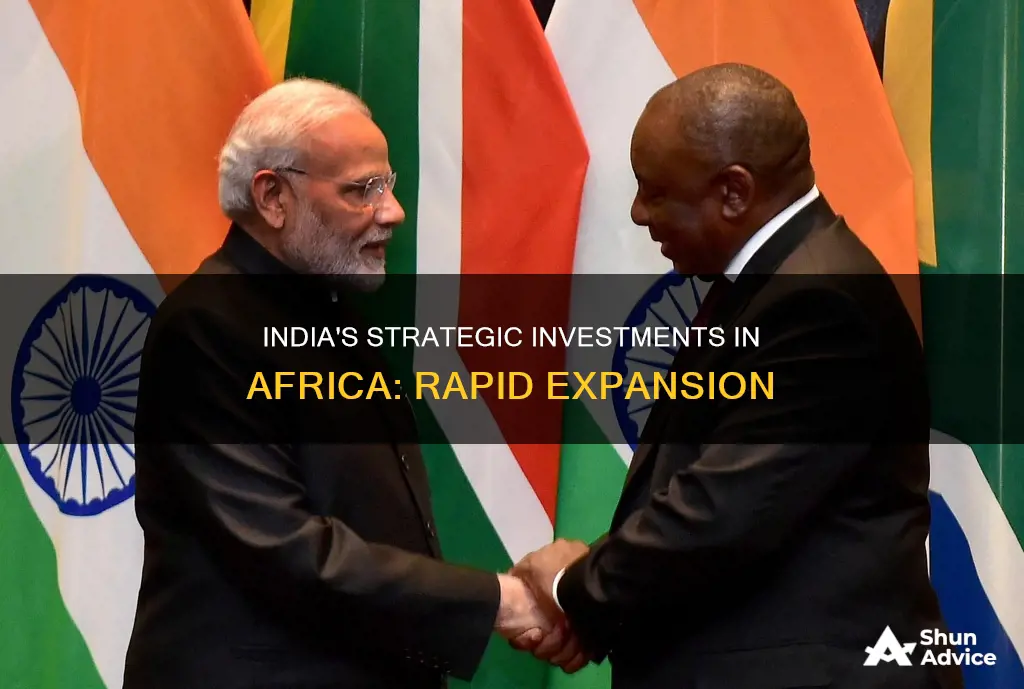
India has been rapidly expanding its investment in Africa, with the value of bilateral trade increasing more than eight-fold from $7.2 billion in 2001 to $62.6 billion in 2017-18. India is now the third-largest national trading partner of Africa, and its investments have grown substantially across the continent and sectors. Indian multinational enterprises present in Africa range from energy to mining to telecommunications to IT-enabled services. India has also taken the lead in helping Africa overcome the digital handicap and has launched the second phase of the Pan Africa e-Network project, which aims to provide free tele-education and medical education to African countries.
What You'll Learn
- India's investments in Africa are largely in the oil, gas, and mining sectors
- India's investments in Africa are highly concentrated geographically
- India's investments in Africa are dominated by a few large firms
- India's investments in Africa are mostly in a few countries
- India's investments in Africa are driven by energy security concerns

India's investments in Africa are largely in the oil, gas, and mining sectors
India's investments in Africa are largely focused on the oil, gas, and mining sectors, with a significant portion directed towards Mauritius, a tax haven. From 2008 to 2016, Indian foreign direct investment (FDI) outflows to Africa totalled US$52.6 billion, accounting for about 21% of its total investment outflows. The top 11 Indian companies account for 80% of these investments, with Oil and Natural Gas Corporation's overseas division, ONGC Videsh, being the largest investor. The growth in Indian investments in Africa can be attributed to economic reforms and increasing energy requirements, with energy security being a key factor.
Indian public sector oil and gas companies, such as ONGC Videsh, Gujarat State Petroleum Corporation, and Oil India Limited, are among the leading investors in Africa. ONGC Videsh has invested in six African countries: Congo, Egypt, Ivory Coast, Libya, Mozambique, and Sudan. In 2014, it purchased a 10% participating interest in Mozambique's Rovuma gas field, which is estimated to hold about 70 trillion cubic feet of gas. This investment alone accounted for the peak in Indian FDI outflows to Africa in 2014.
Indian private sector companies have also made significant investments in Africa, particularly in the energy sector. For example, private corporations like Reliance, Varun Beverages, Bharti Airtel, Essar Group, and the TATA Group have invested heavily in various African countries. Additionally, small and medium Indian enterprises are also present on the continent.
While Indian investments in Africa are largely concentrated in the oil, gas, and mining sectors, there is a growing presence in other sectors as well. Indian companies have made sizeable investments in banking, pharmaceuticals, textiles, and manufacturing. The TATA Group, for instance, has a diverse range of investments in South Africa, including hospitality, steel, and information technology.
The Indian government has played a crucial role in promoting trade and investment with Africa through initiatives such as "Focus Africa" in 2002 and the India-Africa Forum Summit in 2008. The Asia-Africa Growth Corridor, launched in 2017, further strengthened economic cooperation between India, Japan, and multiple African countries. India has also taken a lead in helping Africa overcome digital challenges and has provided educational and medical assistance through various projects.
In summary, India's investments in Africa are largely focused on the oil, gas, and mining sectors, driven by energy security concerns and economic growth. However, there is a diverse range of investments across other sectors, and the Indian government continues to promote and strengthen economic ties between the two regions.
Portfolio Net Assets: A Concern for Investors?
You may want to see also

India's investments in Africa are highly concentrated geographically
Mozambique, with a share of about 52.9%, is the leading destination for Indian FDI in Africa, largely due to a single very large investment by the Indian state-owned company, ONGC Videsh, in the Rovuma gas field. However, it is important to note that Indian investments in Mozambique are almost exclusively in the energy sector.
Egypt is the second-largest destination for Indian investments in Africa, with a share of about 12%. Similar to Mozambique, most Indian investments in Egypt are concentrated in the energy sector, particularly in oil and gas. However, there are also some Indian companies investing in the manufacturing sector, such as pharmaceuticals and petrochemicals.
South Africa, with about an 8.8% share, is another significant recipient of Indian FDI. The TATA Group is one of the most active Indian companies in South Africa, with investments in various sectors including hospitality, steel, and information technology. Other prominent Indian companies in South Africa include Larsen and Toubro Infotech, and Marico Industries.
Tunisia, Kenya, Zambia, Libya, Ethiopia, and Morocco are also among the top recipients of Indian FDI outflows to Africa, with each country attracting between 3% to 6% of Indian FDI outflows to the continent. Indian investments in these countries are diverse and span sectors such as manufacturing, construction, banking, and agriculture.
While the East and North African regions receive the majority of Indian investments, the South and West African regions receive smaller shares, with a 9% and 5% share, respectively. Additionally, Middle African countries attract relatively little investment from India.
The concentration of Indian investments in specific regions and countries in Africa is influenced by various factors, including the presence of natural resources, particularly in the energy sector, and the growth of the middle class.
Understanding Investment Management Fees: Are You Overpaying?
You may want to see also

India's investments in Africa are dominated by a few large firms
From 2008 to 2016, 597 Indian companies invested a total of US$5 billion in Africa, with the top 11 companies accounting for about 80% of the total investment flows. This concentration of investment within a few large firms highlights the dominance of certain industries and companies in India's economic engagement with Africa.
The energy sector, particularly oil and gas, is a key area of investment for Indian public sector enterprises. ONGC Videsh, the overseas division of the Oil and Natural Gas Corporation, is one of the most active Indian companies in Africa. It has invested in several African countries, including Congo, Egypt, Ivory Coast, Libya, Mozambique, and Sudan. Other state-owned companies, such as Gujarat State Petroleum Corporation and Oil India Limited, have also made substantial investments in the energy sector in countries like Egypt and Libya.
In addition to the energy sector, Indian private sector companies have invested in a range of non-energy sectors across Africa. For example, Interlabels Industries, a manufacturer of self-adhesive labels, has made significant investments in Kenya. TATA Group, a well-known Indian conglomerate, has a strong presence in South Africa with investments in hospitality, steel, and other sectors. Other large private sector companies, such as Varun Beverages and Tata Motors, have also made notable investments in multiple African countries.
While the majority of Indian investment in Africa comes from a few large firms, there are also many small and medium-sized enterprises operating in the continent. These smaller companies, particularly those in the manufacturing sector, may have a more significant impact on local development through job creation and forward and backward linkages.
Overall, India's investments in Africa are dominated by a handful of large firms, primarily in the energy and manufacturing sectors. This concentration of investment reflects the strategic importance of these sectors for India's economic engagement with the African continent.
A Beginner's Guide to Investing in India INX
You may want to see also

India's investments in Africa are mostly in a few countries
India's investments in Africa are largely driven by its energy security concerns and the continent's vast natural resources. While Indian investments span a range of sectors, including oil and gas, mining, banking, pharmaceuticals, and textiles, the energy sector stands out as a key area of focus. From 2008 to 2016, Indian foreign direct investment (FDI) outflows to Africa totalled US$52.6 billion, with Mauritius, Mozambique, Egypt, South Africa, Tunisia, Kenya, Zambia, Libya, Ethiopia, and Morocco being the top destinations. However, excluding Mauritius due to its status as a tax haven, the majority of Indian FDI flows to Africa are concentrated in a few countries, with Mozambique, Egypt, and South Africa being the top recipients.
The growth of Indian investments in Africa can be attributed to several factors. Firstly, economic reforms in the 1990s liberalised rules and procedures for outward investments, making it easier for Indian companies to invest abroad. Secondly, India's high growth rates and increasing energy requirements have driven the country to diversify its energy suppliers and invest in oil and gas ventures abroad. African countries, with their abundant energy resources, have become attractive investment destinations.
Indian public sector companies, such as Oil and Natural Gas Corporation's overseas division, ONGC Videsh, have been particularly active in the African energy sector. ONGC Videsh has invested in several African countries, including Mozambique, Egypt, Ivory Coast, Libya, and Sudan. Other Indian public sector oil and gas companies, such as Gujarat State Petroleum Corporation and Oil India Limited, have also made significant investments in Africa.
In addition to the energy sector, Indian private sector companies have invested in a range of non-energy sectors, including manufacturing, petrochemicals, fast-moving consumer goods, and hospitality. Large private sector companies like Reliance, Varun Beverages, Bharti Airtel, Essar Group, and the TATA Group have made substantial investments in select African countries. However, their operations tend to be limited to one or two countries, and they have not expanded their presence across the continent.
While Indian investments in Africa have grown significantly, they face challenges such as transport and logistics costs, poor business environment, corrupt practices, and access to trade finance. Despite these challenges, the strong historical and cultural ties between India and Africa, along with Africa's vast natural resources and growing markets, continue to make the continent an attractive investment destination for Indian companies.
Foreign Investment: India's Necessary Economic Evolution
You may want to see also

India's investments in Africa are driven by energy security concerns
Africa's role as a supplier of minerals and fuels to India has intensified in recent years, with the continent now providing around a fifth of India's total crude oil imports, up from nearly zero in 2005. Indian national oil companies, such as the Oil and Natural Gas Corporation Videsh Limited (ONGC), have made significant investments in African countries, including Sudan, Ivory Coast, Libya, Egypt, and Nigeria. Private sector companies, such as Reliance and Essar, have also invested in equity oil and exploration and production blocks in Sudan, Madagascar, and Nigeria.
In addition to crude oil, India has also invested in other energy sources in Africa, such as natural gas and liquefied natural gas (LNG). Indian investments in Africa's energy sector are not limited to oil and gas, as the country has also invested in solar power and hydroelectric projects.
The growth of Indian investments in Africa's energy sector can be attributed to a combination of factors, including India's economic reforms in the 1990s, which liberalized rules and procedures for outward investments, and the increasing energy demands of a growing economy. Africa's own economic growth and emergence as an attractive investment destination, particularly in the energy sector, have also played a significant role.
However, Indian public sector companies have faced challenges in Africa's energy market, with some having to relinquish blocks due to poor commercial prospects, inability to meet contractual agreements, or because the blocks were still in the exploratory phase. Despite these challenges, India's investments in Africa's energy sector continue to grow, driven by the country's energy security concerns and the recognition of Africa's potential as a reliable energy supplier.
REIT Investment: A Guide to India's Real Estate Investment Trusts
You may want to see also
Frequently asked questions
Strategic sectors for Indian multinationals in Africa include agribusiness, pharmaceuticals, information and communications technology (ICT), and energy.
Africa primarily exports crude oil, gold, coal, and other minerals to India.
Mauritius, Mozambique, Sudan, Egypt, and South Africa have been the top recipients of Indian investments.







